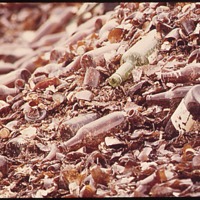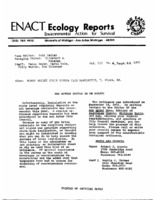See a related article from the Ecology Center's website, Return to Returnables: Michigan’s 1976 Bottle Bill
Returning to Returnables
Before the late 1950s, most beverage containers produced in the United States were returnable, and the bottling industry voluntarily collected containers from consumers to wash and reuse. But as the 1950s progressed, it became less expensive to produce bottles for one-time use, a convenience for which Americans were willing to pay a little more. As the industry switched from returnable to throwaway containers, those bottles and cans began to litter roadsides and public spaces. After receiving complaints about litter from their constituents, Michigan representatives introduced bills in 1966 and 1967 to ban throwaway containers and create a deposit system for returnable containers. However, representatives of the bottling industry sowed fears among the public about how these measures might affect Michigan’s industry-driven economy. The legislation never gained traction, though the problems persisted.
In the early 1970s, concerned citizens and environmental activist organizations like the Ecology Center reframed Michigan’s litter problem as an environmental issue.
“‘Convenience’ has been sold to the buying public. The pull-top tab, the twist-off cap, no-deposit, no-return, the throw-away, ad infinitum. What is not mentioned is that ‘convenience’ has a price, albeit hidden, and it is not being paid for by industries that have profited from it. The taxpayer bears the cost of removing throwaway containers from our roadsides. The consumer pays for the manufacture of each container that is thrown away instead of being refilled for reuse. Taxpayers absorb yet another cost as they fund municipal refuse collections which must collect and dispose of the over 50-billion beverage containers produced each year.” — Ecology Report, September 22, 1972
When statewide efforts to ban the use and sale of throwaway containers failed, many wrote their own ordinances to address the issue in cities across the state. The Ecology Center proposed one such ordinance for Ann Arbor in 1972. By educating the ordinance’s critics, the Ecology Center convinced City Council to approve the measure in 1973, although a lawsuit prevented it from going into effect. Using the lessons it had learned, the Ecology Center collaborated with other environmental organizations to pass the Michigan Bottle Bill in 1976 in a statewide referendum.


